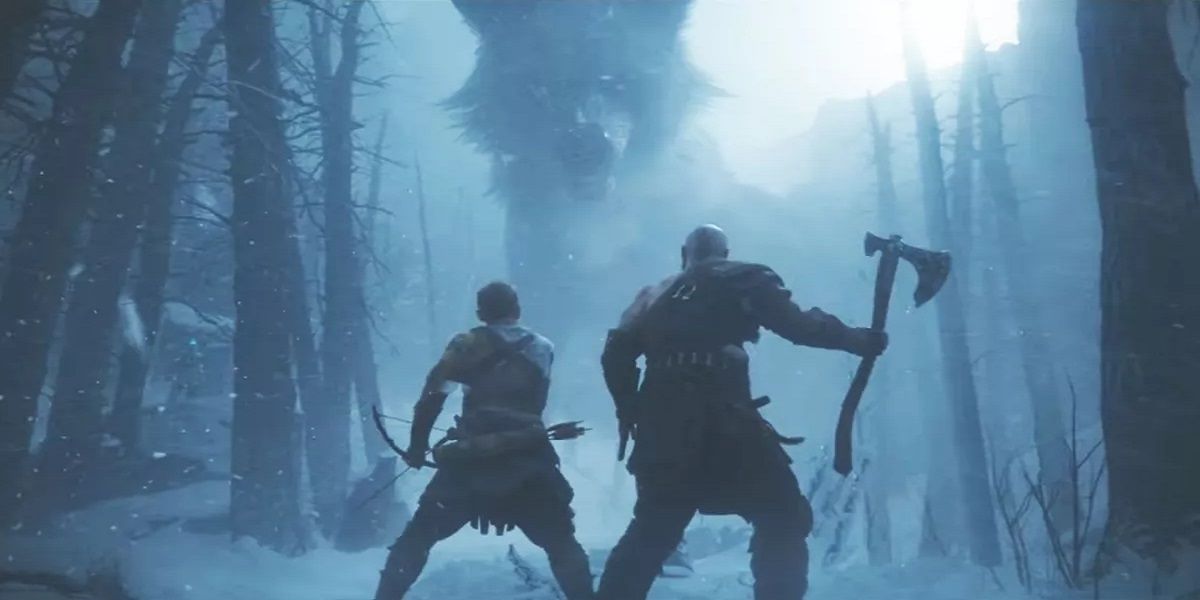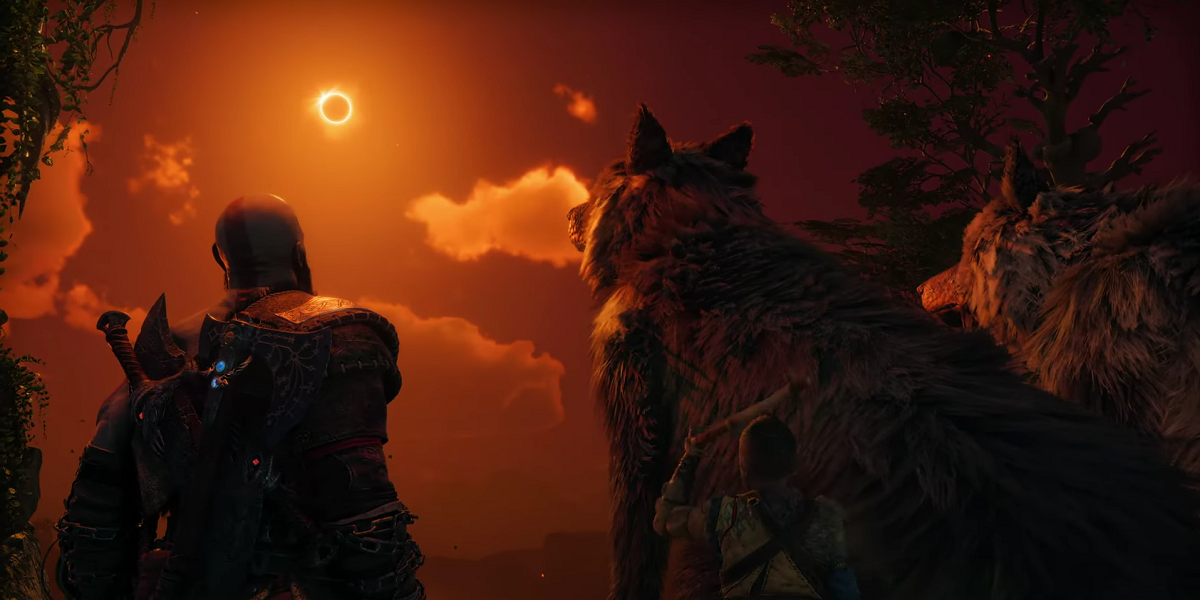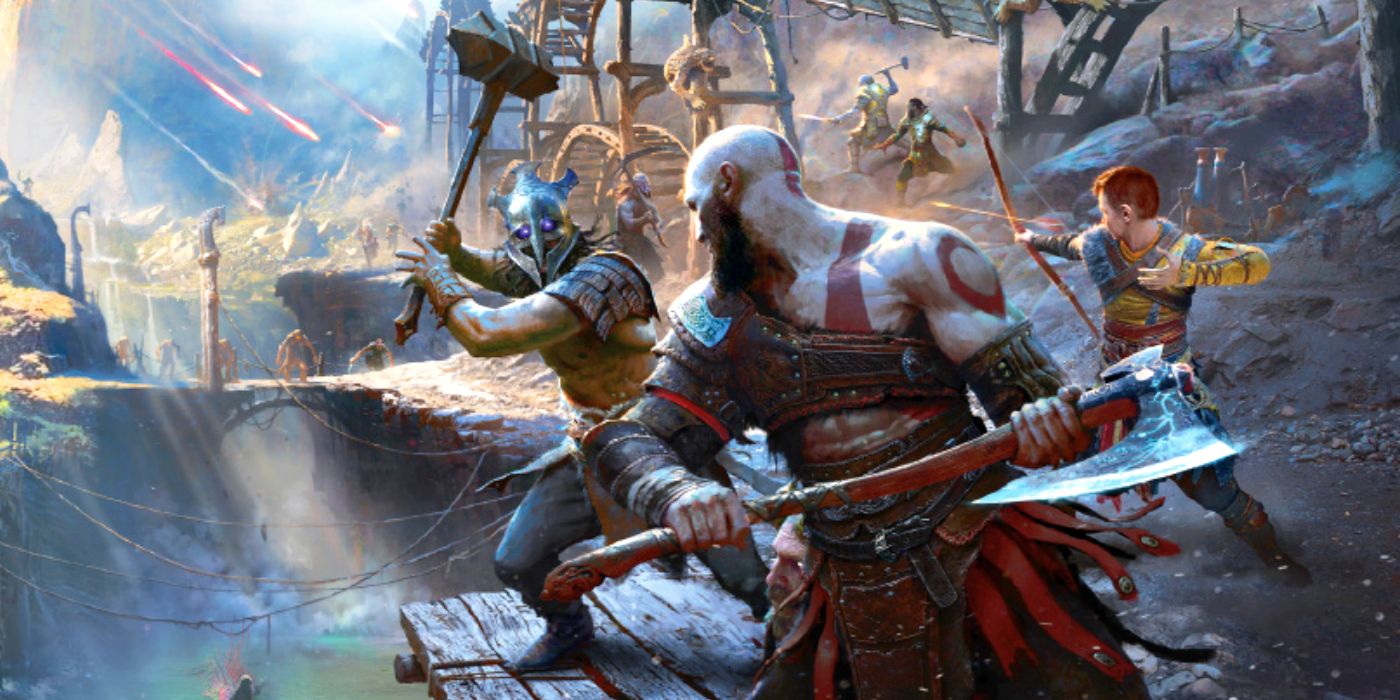The latest God of War: Ragnarök trailer teased during PlayStation's recent State of Play expo gave fans a lot to digest. From a greater dig into the axe-swinging gameplay on offer to a better look at the role that the likes of Tyr will likely play in Kratos and Atreus' upcoming tussle with Thor and Odin, the trailer also teased the one character with perhaps the greatest significance in all of Ragnarök's narrative: the great wolf Fenrir.
Fenrir's first proper appearance actually came a few months earlier courtesy of a semi-cinematic teaser titled "Father and Son" in which the giant creature loomed menacingly over our heroes with what seemed to be deadly intent. The State of Play trailer, however, subverted this chilling image for something far more benign, instead situating the great wolf's children, Sköll and Hati, beside Kratos and Atreus as the latter fires an arrow into the sky in what seemingly triggers the start of Ragnarök itself. Just as the World Serpent Jörmungandr was initially teased as a villainous force before the game's narrative revealed him to be a powerful, benign force, so too could Fenrir and his children turn out to be our protagonist's greatest allies in the upcoming war at the end of the universe.
To understand why Fenrir may in fact be a benevolent character rather than an impediment to Atreus and his father's quest, it's vital to examine the great wolf's significance within Norse mythology. According to Nordic myth, Fenrir is the offspring of Loki and the female Jötunn Angrboða, fated to destroy the Aesir, Asgard and the universe in which they dwell. According to the grim prophecy, Fenrir will grow to such a great size that he will end up swallowing Odin whole and ushering in the dreaded Ragnarök, the event that spells the end of not only Havi but of every Aesir god in Asgard. Only when Odin's son Vidar slays Fenrir and the world is submerged in an all-consuming flood will the world be reborn and able to begin anew.
Desperate to avoid this dreadful fate yet unable to spill blood within the sanctuary of Asgard's boundaries, Odin and the other gods attempt to bind Fenrir to prevent him from carrying out his deadly destiny, a destiny briefly alluded to by Mimir when he describes the wolf as being the greatest threat to the gods. After numerous failed attempts to shackle their most feared rival, according to the Poetic Edda, the gods eventually succeed in binding Fenrir by the use of Gleipnir, a cord made of so-called "impossible" materials such as the breath of a fish and the beard of a woman. This, too, is referenced in the God of War reboot when Brok and Sindri tell Atreus that the dwarves are so resourceful they can make unbreakable chains out of apparently impossible ingredients.
The tale of the binding of Fenrir not only reveals the significance that the great wolf has for Odin and the fate of Asgard, but it may also provide various clues for the motivations of many of Ragnarök's other central players. Tyr, for instance, is seen in the latest trailer aiding and assisting Kratos as revenge for his imprisonment at the hands of Odin. Tyr may be in part motivated by the fact that he lost his hand when binding Fenrir by placing it in the wolf's mouth as a show of good faith that no trickery was befalling him. According to Norse mythology, it is Tyr who befriends the wolf when his Aesir brothers and sisters shun and malign the deadly creature.
Much of Fenrir's significance, of course, derives from his being Loki's son. As we know, Atreus is revealed to be Loki at the end of 2018's God of War, meaning that the Fenrir will likely be as keen to aid his father in the vanquishing of the Aesir as Loki is desperate to punish Odin and the other gods for their imprisonment of his beloved son. How much of this is known to Atreus remains unclear, especially as Kratos' son seemed unaware of his confusing lineage for much of God of War's narrative.
It seems that the story of Ragnarök will not simply be one of Atreus and Kratos as outsiders facing off against the entire might of the Nordic mythological canon, but rather a civil war in which the lines of battle have become blurred and divided, sometimes across familial boundaries. With Fenrir, his father Loki/Atreus, his brother Jörmungandr, sons Sköll and Hati, and Tyr, facing off against the might of Thor, Odin, Freya and the other Aesir gods, Ragnarök is sure to be an epic of earth-shattering, world-ending proportions.
Whether the story plays out quite as the sagas and epic poems of Norse literature would have us believe is another matter. The God of War series has crafted its identity on bending and adapting mythology to its own will, meaning that the established stories and tales passed down as part of Nordic myth may not be so closely adhered to by Santa Monica Studio's creative team for their hugely anticipated sequel. Odin might have been tied to his inescapable fate as tightly as the bonds that dug into the flesh of the mighty wolf Fenrir, but as Kratos rather gruffly reminds us over the epic State of Play trailer, "Fate only binds you if you let it."



.jpg)
